Compliance and Regulation Law bilingual Dictionnary
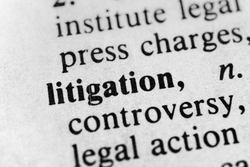
The procedural safeguards enjoyed by a person whose situation may be affected by a future judgment are principally the right to bring proceedings before the court, the rights of the defense and the benefit of the contradictory principle.
The legal action was for a long time considered as a "power", that is to say, a mechanism inserted in the organization of the judicial institution, since it was by this act of seizure, access by which the person enters the judicial machine, through the latter starts up.
But in particular since the work of René Cassin and Henri Motulsky, legal proceedings are considered as a subjective right, that is to say, a prerogative of any person to ask a judge to rule on the claim that the plaintiff articulates in an allegation, that is a story mixing the fact and the law in a building and on which he asks the judge to give an answer, such as the cancellation of an acte, or the award of damages, or the refusal to convict him (because the defense is also the exercise of this right of action).
The legal action is now recognized as a "right of action", the nature of which is independent of the application made to the court, a subjective procedural right which doubles the substantive subjective right (eg the right to reparation) and ensures the effectiveness of the latter but which is autonomous of it. This autonomy and this uniqueness in contrast with the variety of the sort of disputes (civil, criminal or administrative) makes the right of action a pillar of the "Procedural Law" on which a part of European and Constitutional Law are built. In fact, Constitutional Law in Europe is essentially constituted by procedural principles (rights of defense, impartiality, right of action), since the principle of non bis in idem is only an expression of the right of action. Non bis in idem is a prohibition of double judgment for the same fact which does not prohibit a double trigger of the action (and criminal, civil and administrative). This unified due process of Law has helped to diminish the once radical separation between criminal law, administrative law and even civil law, which are clearly separated from one another in the traditional construction of legal systems and which converge today in the Regulatory and Compliance Law.
Moreover, the subjective right of action is a human right and one of the most important. Indeed, it is "the right to the judge" because by its exercise the person obliges a judge to answer him, that is to say to listen to his claim (the contradictory resulting therefore from the exercise of the right of action ).
Thus the right of action appears to be the property of the person, of the litigant, of the "party". This is why the attribution by the law of the power for the Regulators to seize itself, which is understood by reason of the efficiency of the process, poses difficulty from the moment that this constitutes the regulatory body in "judge and party", since the Regulator is in criminal matters regarded as a court, and that the cumulation of the qualification of court and of the quality of party is a consubstantial infringement of the principle of impartiality. In the same way, the obligation that Compliance Law creates for operators to judge themselves obliges them to a similar duplication which poses many procedural difficulties, notably in internal investigations.
There is a classical distinction between public action, which is carried out by the public prosecutor, by which the public prosecutor calls for protection of the general interest and private action by a person or an enterprise, which seeks to satisfy its legitimate private interest. The existence of this legitimate interest is sufficient for the person to exercise his or her procedural right of action.
In the first place, the person could not claim the general interest because he or she was not an agent of the State and organizations such as associations or other non-governmental organizations pursued a collective interest, which could not be confused with the general interest. This procedural principle according to which "no one pleads by prosecutor" is today outdated. Indeed, and for the sake of efficiency, Law admits that persons act in order that the rule of law may apply to subjects who, without such action, would not be accountable. By this procedural use of the theory of incentives, because the one who acts is rewarded while and because he or she serves the general interest, concretizing the rule of law and contributing to produce a disciplinary effect on a sector and powerful operators, procedural law is transformed by the economic analysis of the law. The US mechanism of the class action was imported into France by a recent law of 2014 on "group action" (rather restrictive) but this "collective action" , on the Canadian model, continues not to be accepted in the European Union , Even if the European Commission is working to promote the mechanisms of private enforcement, participating in the same idea.
Secondly, it may happen that the law requires the person not only must have a "legitimate interest in acting" but also must have a special quality to act. This is particularly true of the various corporate officers within the operators. For the sake of efficiency, the legal system tends to distribute new "qualities to act" even though there is not necessarily an interest, for example in the new system of whistleblowers, which can act even there is no apparent interest.
Compliance and Regulation Law bilingual Dictionnary
March 16, 2022
Teachings : Droit de la régulation bancaire et financière - semestre 2022

 ► Référence complète : Frison-Roche, M.-A., La Régulation internalisée dans les opérateurs bancaires et financiers : le Droit de la Compliance, in Leçons de Droit de la Régulation bancaire et financière, Sciences po (Paris), 16 mars 2022.
► Référence complète : Frison-Roche, M.-A., La Régulation internalisée dans les opérateurs bancaires et financiers : le Droit de la Compliance, in Leçons de Droit de la Régulation bancaire et financière, Sciences po (Paris), 16 mars 2022.
____
► Résumé de la leçon sur le Droit de la Compliance : La Compliance, ne serait-ce que par ce terme même, est un mécanisme nouveau dans les systèmes juridiques européens, venant en convergence du Droit de la concurrence, du Droit financier et du Droit du commerce international. L'on considère généralement qu'il provient du Droit financier et du Droit américain, qui développe ainsi d'une façon extraterritoriale ses conceptions juridico-financières.
Est ainsi en train de naître un Droit de la Compliance.
Il pourrait être celui qui disciplinerait l'économie numérique, laquelle croise étroitement l'économie bancaire et financière, qu'elle renouvelle, comme celui qui apportera des solutions pratiques aux enjeux climatiques en ce qu'il est une branche du Droit Ex Ante et que, contrairement au Droit de la Régulation dont il est pourtant le prolongement, il ne dépend pas de l'existence préalablement établie d'un "secteur".
Pour en mesurer l'importance et le développement, qui ne font que commencer, le plus probant est de commencer par sa dernière manifestation en Droit français, à savoir la promulgation en France le 9 décembre 2016 de la loi dite "Sapin 2", suivant de peu la loi du 21 juin 2016 sur les abus de marché et suivie de peu par la loi du 27 janvier 2017 sur le devoir de vigilance des sociétés mère, source d'inspiration du projet de directive européenne déposée par la Commission européenne en 2022.
____
🔎 Accéder aux slides servant de support à la leçon sur l'émergence du Droit de la Compliance
🔎 Revenir aux bases avec le Dictionnaire bilingue du Droit de la Régulation et de la Compliance
🔎 Approfondir par la Bibliographie générale de Droit de la Régulation bancaire et financière
🔎 Revenir à la présentation générale du cours
🔎 Se reporter au plan général du cours
____
Voir ci-dessous la bibliographie de base et d'approfondissement sur le Droit de la Compliance ⤵️
March 10, 2021
Teachings : Banking and Financial Regulatory Law - Semester 2021

Résumé de la dernière leçon : La Compliance, ne serait-ce que par ce terme même, est un mécanisme nouveau dans les systèmes juridiques européens, venant notamment en convergence du Droit de la concurrence, du Droit financier et du Droit du commerce international. L'on considère généralement qu'il provient du Droit financier et du Droit américain, qui développe ainsi d'une façon extraterritoriale ses conceptions juridico-financières.
Est ainsi en train de naître un Droit de la Compliance.
Il pourrait être celui qui disciplinerait l'économie numérique, laquelle croise étroitement l'économie bancaire et financière, qu'elle renouvelle.
Pour en mesurer l'importance et le développement, qui ne font que commencer, le plus probant est de commencer par sa manifestation incontestable en Droit français, à savoir la loi du 9 décembre 2016 de la loi dite "Sapin 2", suivant de peu la loi du 21 juin 2016 sur les abus de marché et suivie de peu par la loi du 27 mars 2017 sur le devoir de vigilance des sociétés donneuses d'ordre.
Revenir aux bases avec le Dictionnaire bilingue du Droit de la Régulation et de la Compliance
Approfondir grâce à la Bibliographie générale du cours de Droit de la Régulation bancaire et financière
Revenir au plan général du cours de Droit de la Régulation bancaire et financière
Revenir à la présentation générale du cours de Droit de la Régulation bancaire et financière
Parcourir les billets quotidiens d'actualité sur la Compliance.
Utiliser les matériaux ci-dessous pour aller plus loin et préparer votre conférence de méthode:
Nov. 18, 2020
Conferences
🎥Compliance Law, an adequate legal framework for GAIA-X, in 🧮GaiaX Summit2020, The World with GAIA-X

► Full Reference: M.-A. Frison-Roche, "Compliance Law, an adequate legal framework for GAIA-X", in Pan-European GAIA - X Summit, The World with GAIA-X, November18, 2020.
____
🧮See the general presentation of the Summit
____
📈See the slides, basis of this intervention.
____
► Summary of the intervention: Europe may offer an adequate legal framework for the GAIA-X project through Compliance Law. Compliance Law is a new form for Regulatory Law, driven by "Monumental Goals", negative Monumental Goals, for instance prevention of systemic failures, and positive Monumental Goals, for instance innovation or stability. This very new branch of Law works on these Monumental Goals, which must be explicit and internalized in Crucial Enterprises. These Crucial Enterprises concretize these Goals, supervised by public Authorities.
European Compliance Law already works, for instance about Personal Data protection (case law and GDPR) or prevention banking systemic failures (Banking Union), Compliance Tools being in balance with Competition principle. European Union Law is moving from the Ex-Post Competition Law to the Ex-Ante Compliance Law, internalizing Monumental Goals in Crucial Enterprises.
There is a perfect adequacy between European Compliance Law and GAIA-X. This project built by Crucial Enterprises must be supervised by public authority, maybe a specific or the European Commission. The governance of GAIA-X must be transparent and accountable. This private organization must use it powers in respect of the proportionality principle, controlled by the public supervisory body. The legal framework is required but it is sufficient.
___
📈see the slides, basis of this intervention.
____
🎥watch the video of this intervention.
________
Sept. 15, 2020
Conferences
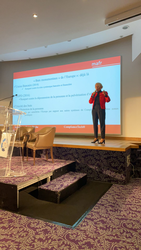
Full reference : Frison-Roche, M.-A., Le "Droit européen de la Compliance" : un rempart contre la crise ? ("European Compliance Law": a bulwark against the crisis?") in Option Finances, Les Défis Conformité / Compliance (Conformity/Compliance Challenges), 15th of September 2020, Paris.
Read the program (in French)
Read the slides of the intervention (in French)
It was possible to attend to the manifestation in live
A bilingual video will be aviaible soon.
Summary of the intervention:
This intervention as keynote speaker was at the articulation between the first two sessions, one on "strategy in times of crisis" and the other on "good governance", and the third session on technology.
Because the question is: "?Does Europe has the pretension to prevent crisis, thank to Compliance Law ?" The answer must be: Yes or No.
If Europe has this pretension to allow answering Yes, and it must have it, it must have, through its public institutions and the crucial European companies - expressing their raison d'être - a clear, simple and coherent vision of the "monumental goals" that it pursues.
Compliance Law is adequate for such an "enterprise" (an "enterprise" always being an "adventure"!footnote-1902) since it is defined through its monumental goals, including crisis prevention, for which Europe must and is able to develop an exemplary model.
When this is done, and it is in the process of being done, it is necessary but sufficient to carry out the technical work of adjusting the legal technical tools with these monumental goals.
____

June 18, 2020
Publications

♾️follow Marie-Anne Frison-Roche on LinkedIn
♾️subscribe to the Newsletter MAFR Regulation, Compliance, Law
____
► Full Reference: M.-A. Frison-Roche, The dreamed Compliance Law, Working Paper, June 2020.
____
This Working Paper, "The Dreamed Compliance Law", is the basis for an article, written in French, "La compliance" (Compliance), inserted in the collective work to be published under the direction of Jean-Baptiste Racine, Le Droit économique du XXIème siècle (The XXIe century Economic Law , in the Serie Droit & Economie, LGDJ-Lextenso, 2020.
________
No one can know what the Law of the 21st century will be. Pretending to know it is just not to realize its ignorance. Why then writing about it, since the future is always surprising?
One can only write about the unknown part of the Law of tomorrow. If the future is then modeled on what was written, so much the better for the prophet, a tribute that can, for example, be paid to Pierre Godé
Lévi-Strauss argued that teaching is defined as dreaming out loud. Teaching and describing the Law of a century that we will never know gives even more freedom to dream about it. This freedom increases when the object is a branch of Law in the process of being born, state of the stammering "Compliance Law" of which some still maintain, as it was made for Regulation Law, that there is not existing. The hand can then, as it pleases, trace its beautiful or hideous features: what face will Compliance Law have, as soon as we assume that it will exist?
It may as well be a nightmare (I) as a happy dream (II).
It is up to us to choose in which category this branch of Law will flourish. Because what we can be sure of is this fulfillment. It is certainly already taking sides to presuppose the very existence of Compliance Law. Not only to consider it possibility with hostility because to be an enemy of something or someone is already to recognize their existence. Before that, two objections radically block the very existence of Compliance Law and their shadow remains in the future of it
Firstly, it is said that Compliance does not come under Law, but for example only ethics since it would consist in keeping well in companies which care about the interest of others or the planet, for example by spontaneous care of the environment; Compliance being a crystallization of social responsibility, the one for which we have our conscience, we express our "raison d'être" and we are not accountable
Second, there would be many Compliance mechanisms but insufficient to constitute a branch of Law. Indeed we would find Compliance in Company Law, Labor Law, Financial Law, Banking Law, Criminal Law, Administrative Law, European Law, International Law, etc.
These classic branches, which have been formed for so long, depending on the point of view adopted, would gain in modernity or be threatened with decay by this kind of extension which will be Compliance. There would thus be as many "little legal sectoral rules" as there are branches of law. These new internal developments would be like a new bud, on which care should be taken - if the tree regains its strength - or a weed to be eradicated - if the French garden loses its perspective.
Thus the matter being scattered as many as specialist lawyers, often criminalists or specialists in banking and Financial Law, then tomorrow all specialists in all branches of Law, this could constitute the most radical obstacle to the constitution of Compliance Law. Indeed, we would come back to confuse Compliance and the "modernization" of Law itself as a whole, since it would only be a question of perfecting each of the classic branches of the legal system.
If we keep in this half-sleep that is any projection in the future the hope of a constituted branch of Law, we must discard these two perspectives of annihilation, either in the total absence of Law or in recovery by all Law. To dismiss the sorrowful spirits who see no future in Compliance and keep only its enemies in the space of this article, let us assume that Compliance Law will exist in the 21st century. In what form and by what means, in the palm of which institutions, in the shadow of which legal system? Since it is a question of projecting ourselves onto the black screen of our nights of dreamy lawyers, let us take the current state only as a trailer. Like the one developed by the genius who by the contempt not only brought down into the flames of hell the cinema which has become a consumer industry with which producers force-feed us but offered us the vision of its future. What is what we see today the trailer? We let our imagination run wild since the trailer films are autonomous works compared to the film which follows them.
We have no idea what will happen and what we are watching from the brief and violent current images of Compliance Law, the cinema of which rather makes a hero of the whistleblower
Everything will depend on the concept that we will retain of Compliance Law. Because the script is not written, because Compliance Law is a Law with a political dimension, that it is defined by the ambitions that we can claim to have by setting monumental goals that we are going to achieve, a claim that will make it one major branch of the Law of tomorrow, or we can abandon any claim, lower our heads and arms, and reject any claim. It is then that the power of Compliance Law, which will be no less great, will turn against us, human beings, as in a nightmare.
Mélanges Pierre Godé, off-trade book, 2019.
Godé, P., Le Droit de l'avenir (Un Droit en devenir), 1999.
It is in particular the idea of the movement of analysis of Law & Literature which poses that by telling the past in one way or another, by thus inventing it, Law, and in particular the Judge, invents the future and being written, creates it. On this movement which was powerful in the United States, v. Cabrillac, R. et Frison-Roche, M.-A., Droit et Littérature, à paraître.
See infra I. Compliance Law as nightmarish octopus.
On the fact that "social responsibility" makes it possible not to be legally responsible, cf. Supiot, A., Du nouveau au self-service normatif: la responsabilité sociale des entreprises, 2004; this is not the subject of this article and this question will not be developed here.
See, for instance, ..., Replace Regulation by norm by Regulation by Data, 2020.
See, for instance, Frison-Roche, M.-A., Compliance Law (monography), 2016 ; Compliance Law, 2020.
On what the cinema does with the whistleblower, with the availability of trailers and extracts from the films, see Frison-Roche, M.-A., introduction of the article The impossible unicity of the legal category of whistleblowers, 2019.
Frison-Roche, M.-A., ... (retrouver sur LinkedIn).
June 18, 2020
Thesaurus : 01. Conseil constitutionnel
May 28, 2020
Publications
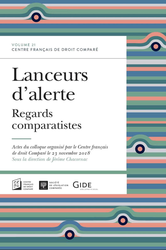
Full reference: Frison-Roche, M.-A., L'impossible unicité juridique de la catégorie des "lanceurs d'alertes" ("The impossible legal unicity of the category of "whistleblowers""), in Chacornac, J. (dir.), Lanceurs d'alertes, regards comparatistes, ("Whistleblowers, comparative perspectives"), Publications of the Centre français de droit comparé ("French Comparative Law Center"), May 2020, Volume 21, p.13-31.
Read the article (in French).
Read the general presentation of the collective book in which this article is published
Read the bilingual working paper which had served of basis for this article.
Read the presentation of the conference "Les lanceurs d'alertes: glose" (Whistleblowers: glose") and especially the slides elabored for the colloquium organized by the Centre français de droit comparé ("French Comparative Law Center") on 23th of November 2018 under the direction of Jérôme Chacornac
____
Introduction of the article
"Whistleblowers". This is a new expression. Which is a great success. Barely heard once, we hear it everywhere ...
A topic not of course or knowledge test, but rather a topic of daily conversation. Because it is spoken to us every day, in more or less gracious terms. For example President Donald Trump on October 1, 2019 declared to the press "want to question" the whistleblower who would have illegally denounced him and would not, according to him, have the right to conceal his identity, proof in this according to him of the lying character of his assertions against him, while his lawyer indicates on October 6, 2019 that he is not speaking on behalf of a single whistleblower thus taken to task but of a plurality of people who gave information against the President of the United States. Even the most imaginative screenwriters would not have written such brutal and rapid twists and turns. Spectators, we are waiting for the next episode, secretly hoping for the escalation.
And precisely if we go to the cinema, it is still a whistleblower whose dedication and success, we are told about, even the drama, for the benefit of global society, and in particular democracy, since the secrets are fought for the benefit of the truth. The Secret Man designates Mark Felt as the first whistleblower. Returning to what we often present as being a more "serious" media!footnote-1391, we listen to France-Culture and here is another story told by a historian who worked as an archivist on events that political power would have liked to keep hidden by possibly destroying their traces but which its trade led to preserve: here it is expressly presented to the studious listeners like a "whistleblower" .... While the same radio tries to find the one who could well be, as in a kind of contest the "first whistleblower"!footnote-1727? .... This rewriting of History can be defended because ultimately what did other Voltaire do for Calas, or Zola for Dreyfus?
It is also a subject of legislative discussion since in the United States the Dodd-Frank law of 2010 inserted in the law of 1934 which established the Securities & Exchanges Commission a complete device of remuneration and remuneration of the whistleblowers, whereas after having developed flexible but guiding lines in this regard in 2012!footnote-1698, the European Commission published on November 20, 2018 the text of what will become a Directive intended to give a unified European status to the character, in the system gradually developed to protect the one who was presented in 2018 as that "cannot be punished for having done what is right".
In Europe, the Directive first approved by a Resolution of the European Parliament on April 16, 2019 on the protection of persons denouncing breaches of Union Law and then adopted on October 7, 2019 (Directive of the European Parliament and of the Council of European Union on the Protection of Persons who Report Violations of European Union Law, different title, it should be noted, will have to be transposed into the laws of the Member States within the next two years. , since only "violations of Union Law" are targeted, but the character of the "whistleblower" is more generally targeted: he is "whole"!footnote-1699.
In short, the whistleblower is a star!footnote-1390. A sort of historical figure, covered in blows and glory, going from Voltaire to Snowden, both of whom find themselves embodied on the screens!footnote-1681 ....,
Consecrated by law, which associates with it a legal regime of protection to such an extent that, like a Nessus tunic, it is this legal regime which will define the character and not the reverse. When we read the law of December 9, 2016 relating to transparency in the fight against corruption and the modernization of economic life, known as "Sapin 2", we notice that the Legislator makes much of this character, since 'he dedicates its chapter II to him!footnote-1682: "From the protection of whistleblowers", and that it is by his very protection that he formally opens the door of Right to him.
But why a plural? Admittedly when we read the recitals of the Community Directive of October 7, 2019 on the protection of whistleblowers!footnote-1702, it is only a list of all the subjects on which it is a good idea to protect them, which therefore prompts us to see in this plural only the index of this non-exhaustive list of subjects which it is good to tell us, a sign of the lack of definition of who should alert us. Reading the French law known as "Sapin 2" makes it less severe but more perplexing. Indeed, this plurality referred to by the title of the chapter devoted to "whistleblowers", there is no longer any question in the rest of the law, in the very definition which follows, article 6 which opens this chapter devoted to "whistleblowers" offering the reader immediately a singular since it begins as follows: "A!footnote-1684 whistleblower is a person ...". No mention of diversity. The art of legislative writing would however have required that the qualifying article not only be singular but that it should not yet be undefined. Stendhal if he had still deigned to have the law for bedside book would have wanted to find at the beginning of chapter a sentence like: "The!footnote-1683 whistleblower is a person ...".
Thus seem to contradict themselves within the law "Sapin 2 the very title which presents the character, in that it uses a defined plural (the) while the defining article which presents it is in the undefined singular (one). ...
Here is a first reason not to advance any more but in a very careful way, in this "step by step" that constitutes a reading word for word: a gloss. This consists of taking the expression itself literally. The second reason for this technical choice is that the gloss is well suited to the introduction of a collective work, thus allowing more targeted developments to take place in other contributions, on the techniques, the difficulties and the limits of this protection, or on its history, or the reasons for the arrival in French law of these whistleblowers and the way they develop, or not, elsewhere.
I am therefore going to content myself with taking this already legal expression to the letter: The (I) whistle (III). blowers (II).

April 24, 2020
Publications

Its subject is the confrontation between the current health crisis situation and the Compliance Law.
Summary. After defining Compliance Law, distinguishing the procedural and poor definition and the substantial and rich definition, the starting point is to admit the aporia: the type of health crisis caused by Covid-19 will be renewed and it is imperative to prevent it, even to manage it, then to organize the crisis exit. Public Authorities are legitimate to do so, but because this type of crisis being global and the State being consubstantially linked to borders, States are hardly powerful. Their traditional International Law shows their limits in this current crisis and one cannot hope that this configulration will improve radically.
In contrast, some companies and markets, notably the financial markets, are global. But the markets are not legitimate to carry out such missions and counting on the generosity of certain large companies is far too fragile in front of the "monumental goal" that is the prevention of the next health crisis, crisis which must never happen.
How to get out of this aporia?
By Compliance Law, basis of, in a literal and strong sense, the "Law of the Future".
We need to be inspired by the Banking and Financial Compliance Law. Designed in the United States after the 1929 crisis to tend towards the "monumental goal" of the absence of a new devastating crisis in the country and the world, this set of new legal mechanisms gave duty and power of supervision, regulation and compliance to market authorities and central bankers. These are independent of governments but in constant contact with them. Today, they claim to have as first priority the fight against climate change. Now and for the future, they must also be given the responsibility and the powers to prevent a global health disaster, similar to a global ecological disaster, similar to a global financial disaster. This does not require a modification of the texts because their mandate consists in fighting instability. Stability must become a primary legal principle, of which the fight against monetary instability was only a first example. By the new use that central banks must make of it by preventing and managing health crises, Compliance Law will ensure that the future will be not catastrophic.
March 23, 2020
Publications

Without any request, on his or her newsfeed, those who surfs on the social network built by Facebook, has found on 23 of March 2020, in the morning, the following message :
« X (prénom de l'internaute), agissez maintenant pour ralentir la propagation du coronavirus (COVID-19) Retrouvez les actualités des autorités sanitaires et institutions publiques, des conseils pour ralentir la propagation du coronavirus et des ressources pour vous et vos proches dans le Centre d’information sur le coronavirus (COVID-19)" ("X (user's name), act now to slow down the spread of the Coronavirus (COVID-19). Find the health authorities and public institutions' news, advices to slow down the spread of the Coronavirus for you and your entourage in the Information Center about Coronavirus (COVID-19) »).
This corresponds to the more general declaration done the same day by Kang-Xing Jin, director of Health at Facebook, who declares : "In response to the coronavirus outbreak, Facebook is supporting the global public health community’s work to keep people safe and informed. Since the World Health Organization declared the coronavirus a public health emergency in January, we’ve taken steps to make sure everyone has access to accurate information, stop misinformation and harmful content, and support global health experts, local governments, businesses and communities.".
Thanks, Facebook to indicate how to do ; by the way, thanks to having invited me to do it. By the way, is it really an « invitation » ? Since the expression is « act now ». Just miss the exclamation point, and the pointed finger of Uncle Sam for « war effort »!footnote-1770.
If in Law, we can consider « invitation », it would be not to the "invitation" that in the past Bank of France did to shareholders banks to refinance a bank which risks to be soon into difficulties that we could consider, invitation from which the invited cannot really escape. No, obviously no, it is just the same message that you and me can write on our Facebook pages to tell similar things about the same purpose ! But, Facebook would be, like you and me, editor of contents ?
Questions and difficulties which encourage to proceed to the legal analysis to know under which title Facebook posted such a message.
The first hypothesis is that this firm has acted spontaneously, following its « Corporate Social Responsibility » (I) If it is the right qualification, with regards to the content of the message, legal consequences are important because this firm, without generalizing to others, by the expression of its care of common good, shows, by transitivity, that it is an editor.
The second hypothesis starts from the observation that Facebook is a « crucial digital operator ». In this perspective, the firm is constraint to Compliance Law (II). It is the reason why, it is constraint by specific obligations, that excludes the spontaneous message emission qualification. If it is the right qualification, with regards to the content of the message, legal consequences are also important and of a totally different nature. Indeed, the qualification leads to develop the relation between the obligation to fight against fake news and malicious websites towards those of redirecting towards public websites, benefiting for the operator of a reliability presumption.
Read the developments below.
March 18, 2020
Publications

Référence générale : Frison-Roche, M.-A., L'avocat, porteur de conviction dans le nouveau système de Compliance, Dalloz Avocat, mars 2020.
This editorial opens a thematic collective publication about Compliance.
A synthetic article on all the contributions, published in May 2020, mirrors it: "Attorney and Compliance - The future of the character and his tool: Law, Humanism and Defense"
_____
English Summary of the article (written in French) :
If we perceive Compliance Law as an aggression of the private company and a binding set of mechanisms that have no meaning and added value for it, then the attorney has a utility: to defend the business. It can do so not only during the sanctions phase, but also to prevent it.
But this function is not central.
He and she becomes so if we understand Compliance Law as being a body of substantial rules, pursuing a "monumental goal": the protection of the person, goal injected by political bodies and taken up by the operator. From this, the company must convince everyone to take it back, inside the company and outside. In a general and contradictory debate, the attorney carries this conviction, because he and shed is always convincing those who in the end judge (market, public opinion, etc.) that is their raison d'être.
____
March 5, 2020
Conferences

Référence : Frison-Roche, M.-A., La mesure de l'effectivité et de l'efficacité des outils de la compliance (conception, présentation et modération des débats), in Les outils de la Compliance, Journal of Regulation & Compliance.
Voir les autres thèmes, autres dates et autres manifestations particulières du cycle dans son ensemble.
Cette conférence sert d'appui à la réalisation d'un ouvrage plus global portant d'une façon générale sur Les outils de la Compliance.
L'ouvrage Compliance Tools sera publié en même temps.
Présentation de la Conférence : Après avoir examiné différents outils spécifiques, comme La cartographie des risques ou Les incitations, et avant d'en aborder d'autres comme ceux relevant de la a Compliance by Design, celle-ci méritant aussi d'être examinée avec quelque distance dans sa prétention à être la solution à tout enjeu de compliance, il convient de regarder comment l'on mesure l'efficacité de tous ces outils de Compliance. En effet, puisque toutes les techniques sont des "outils", ils ne prennent sens qu'au regard d'une finalité qu'ils doivent atteindre effectivement. Cette effectivité doit être mesurée, et cela dès l'Ex Ante, l'entreprise devant en permanence donner à voir l'effectivité de la performance des outils de la Compliance.
Mais autant les normes prolifèrent, les discours se multiplient, les engagements sont pris, autant les techniques de mesure de l'effectivité de l'ensemble semblent assez faibles. Non pas que les sujets de droit astreints aux obligations de Compliance ou désireux de réaliser les buts systémiques ou de bien commun visés par la Compliance ne désirent pas en avoir, mais ces instruments de mesure semblent encore les moins construits, souvent déclaratifs ou de type discursifs, ou trop mécaniques. Dès lors, est-ce en partant du but que l'on cherche à atteindre que l'on doit mesurer l'efficacité des outils de Compliance, sans que cela transforme les tâches qui pèsent de grè ou de force sur les opérateurs en obligation de résultat ? Ou est-ce en demeurant en amont, par une seule "conformité" à ce qui leur est demandé, comme comportement et comme organisation structurelle, que les entreprises donnent à voir qu'elles ont effectivement rempli leur tâche, sans plus se soucier des effets produits sur la réalité des choses, cette réalité que ceux qui ont conçu la norme avaient en tête ?
Cette question a des implications majeure en terme de charge de preuve et de responsabilité, impliquant des organisations plaçant la confiance, coeur de la Compliance, plutôt dans des instruments technologiques connectant des data ou plutôt dans des personnes ayant le sens du bien commun. Cette question est aujourd'hui ouverte.
_____
Jan. 24, 2020
Thesaurus : Autorité des Marchés Financiers (A.M.F.)

Jan. 17, 2020
Publications

This Working Paper written in English is the basis for an article published in French in the French journal Dalloz Avocat , in March 2020.
Summary of the working Paper.
If we perceive Compliance Law as an aggression of the private company and a binding set of mechanisms that have no meaning and added value for it, then the attorney has a utility: defending the business. It can do so not only during the sanctions phase, but also to prevent it.
But this function is not central.
It becomes so if we understand Compliance Law as a body of substantial rules, pursuing a "monumental goal": the protection of the person, goal injected by political bodies and taken up by the operator. From this, the company must convince everyone to take it back, inside the company and outside. In a general and contradictory debate, the attorney carries this conviction, because he and she is always convincing those who at the end judge (market, public opinion, etc.) that is their raison d'être.
(In this short document, the pop-ups refer to the different works that develop each of the points)
Dec. 24, 2019
MAFR TV : MAFR TV - case

Watch the video commenting on the decision of the Commission des sanctions of the Autorité des marchés financiers - AMF (French Financial Market Authority Sanctions Commission).
Read the decision.
_______________
In 2015, a document supposedly emanating from the Vinci company reached the Bloomberg media announcing unexpected catastrophic results. The two journalists who received it immediately published it without checking anything, the Vinci listed shares losing more than 18%. It was a rude forgery, which a basic check would have established, a check which the journalists had not done.
4 years later, the Bloomerg company is punished for the breach to "disseminate false information" on the financial market, by a decision of the Sanctions Commission of the Autorité des Marchés Financiers (French Financial Markets Authority) of December 11, 2019.
The company being sued argued that it was up to journalists to be accountable and not to itself, because on the contrary the firm had implemented both detection software and a code of conduct, even though there was no legal rule constraining it. In consequence, it would not possible to pursue it.
But the AMF Sanctions Commission stresses that, independently of this, it is a general rule of ethics for journalists that obliges them to verify the authenticity of the documents they publish, which they did not, whereas an elementary check would have allowed them to measure that it is a rude forgery.
In addition, the Sanctions Commission refers to the European Regulation on market abuses which in its article 21 targets the special status to be reserved for press freedom and the special status of journalists, but associates this ethical obligation to verify documents . However, the Sanctions Commission notes that this obligation, which was targeted by both the journalists' ethics and the reference text of Financial Law, was completely ignored by the two journalists. It is therefore up to the press agency to be accountable and to be punished.
However, the media entreprise maintained that the balance between the principle of freedom of the press and the principle of freedom of opinion on the one hand and the principle of the protection of the financial market and of investors against false information disseminated requires an interpretation of the European Union Law, which must oblige the Sanctions Commission to ask a preliminary question to the Court of Justice of the European Union.
The Sanctions Commission dismisses this request because it considers that the European texts are "clear", which allows the Sanctions Commission to interpret them itself. And precisely the European Regulation on market abuse in its article 21 provides for the exception in favor of the press and journalists but compels them to respect their ethics, in particular the verification of the authenticity of documents. In this case, they did nothing. They are clearly the authors of a breach attributable to the company.
________
In a less clear case, one could consider that this balance between two principles, both of public interest, is delicate and that an interpretation by the Court of Justice would always be useful.
Indeed and more fundamentally, does Financial Law remain an autonomous Law, putting first the objective of the preservation of the integration of the financial market and the protection of investors or is it the advanced point of an Information Law protecting everyone against the action of any "influencer" (category to which Bloomberg belongs) consisting in disseminating inaccurate information (notion of "misinformation")?
And that is not so "clear" ....
_____________________
Dec. 18, 2019
Publications

Référence complète : Frison-Roche, M.-A., Le maniement de la propriété intellectuelle comme outil de régulation et de compliance, in Vivant, M. (dir.), Les Grands Arrêts de la propriété intellectuelle, 3ième éd., 2019, 9-11, p.43-53.
This contribution is written in French.
Summary:
Intellectual Property, which comes from the State and is incorporated into public policy, can be designed not to reward the creator a posteriori, but to encourage others to innovate. It is then an Ex Ante regulatory tool, an alternative to the subsidy. If private copying is an exception, it is not in relation to the principle of Competition but in an insertion into a system of incentives, starting from the costs borne by the creator of the first innovation: the rights holder is then protected , not only according to a balance of interests involved but in order not to discourage innovative potentials and the sector itself. (1st decision) ;
The sectoral policy then permeates Intellectual Property, used to regulate a sector, for example that of the drug. While it is true that a laboratory wishing to market a generic drug did not wait for the expiration of the patent for the original drug to do so, it is however not relevant to sanction this anticipation by a few days because the investments made by the holder of the Intellectual Property right have been made profitable by this one and because the public authorities favor the generics in a concern of public health (2nd decision).
Systemic interest prevails and therefore Internet service providers have to bear the costs of blocking access while they are irresponsible because of the texts. This obligation to pay is internalized by Compliance Law because they are in the digital system best able to put an end to the violation of Intellectual Property rights which the ecosystem requires to be effective. (3rd decision).
Read the contribution (in French).
______
Dec. 12, 2019
Conferences
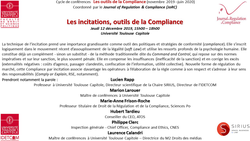
Référence : Frison-Roche, M.-A., La sanction comme incitation dans les techniques de compliance, in Faculté de droit de l'Université Toulouse-Capitole, Journal of Regulation & Compliance (JoRc),Les incitations, outils de la Compliance, 12 décembre 2019.
- Lire la présentation générale du cycle de conférences, consacré au thème Les outils de la Compliance
- Lire la présentation de l'ouvrage qui sera publié ultérieurement
- Lire la présentation de la collection Régulations & Compliance dans laquelle l'ouvrage sera publié
Résumé de la conférence
La Compliance ne se réduit pas à une méthode d'efficacité du Droit. Sinon il convient de l'appliquer à toutes les branches du Droit, ce que l'on ne fait pas. Mais même substantiellement défini, en ce qu'il est un prolongement du Droit de la Régulation, internalisé dans des "opérateurs cruciaux", délié ainsi de la détermination préalable d'un secteur, il conserve la nature téléologique de celui-ci. Le Droit qui est aussi un outil ne devient plus alors que cela, puisque la norme est placée dans le but.
Le renversement du traitement juridique de la matière pénale par la théorie appliquée des incitations
On observe très souvent que le Droit de la Compliance a pour cœur des sanctions, auxquelles Droit, dans son exercice inhérent de qualifié, donne le nom qui correspond à la chose : la "matière pénale". Logiquement, comme pour le droit pénal, qui n'est que la forme juridique de la matière pénale, le régime juridique devrait être le même que le Droit pénal. Mais il n'en est rien en raison de l'application de la théorie des incitations. De cela, les juristes et les juges n'en reviennent pas et c'est pourquoi il y mettent des limites que les tenants de la théorie des incitations n'admettent pas. Cela ne tient pas de la simple technique, de tel ou tel cas, mais de l'opposition de fond. En effet, pour le Droit pénal, celui-ci a vocation à être "autonome" dans le système juridique, c'est-à-dire développe des notions et des régimes qui lui sont propres parce qu'il est une exception légitime au principe de liberté auquel il rend par essence hommage et ne saurait se définir autrement, tandis qu'insérée dans la notion "d'incitation" la technique de la sanction n'intègre en rien cela et se contente d'emprunter à l'efficacité de la dureté pénale pour rendre efficace la règle sous-jacente ainsi dotée, la sanction étant ainsi et par un semblable effet de nature dans une parfaite dépendance. Il y a donc à première vue opposition de fond entre "sanction" et "incitation" alors qu'intuitivement frapper fort est si "commode et dissuasif" lorsqu'on veut obtenir d'une entreprise tel ou tel comportement..
En effet, certes la perspective d'une sanction en Ex Post en cas de manquement est la meilleure incitation à l'obéissance en Ex Ante à la norme d'interdiction et de prescription. C'est pourquoi le droit financier le plus libéral est également le plus répressif, l'analyse économique du droit conduisant à calculer des normes qui amènent l'agent à ne pas avoir intérêt à commettre un manquement. A l'obéissance se substitue l'intérêt. Le Droit de la concurrence et le Droit des marchés financiers en sont à ce point familiers que certains ont douté de la juridicité.
Mais cela produit aussi des chocs en retour très importants, dans une méconnaissance assurée des principes, pourtant de valeur constitutionnelle, constituant la base de la matière pénale. On peut en dresser la liste :
- des sanctions qui ne sont plus l'exception mais l'ordinaire, le cœur dans les régulations des marchés et le droit des entreprises supervisées, contraire aux principes économiques libéraux
- des sanctions d'autant plus élevées qu'elles sont négociables en échange de ce que veut la puissance publique : ainsi la pénalisation n'exclut en rien la contractualisation, au contraire elle en est un sous-outil entre les mains de l'autorité administrative ou politique de poursuite
- des sanctions qui sont conçues indépendamment des principes procéduraux, le couple "droit pénal/procédure pénale" perdant son intimité
- des sanctions qui sont échangées contre des preuves (programmes de clémence, qui sont des outils de Compliance)
- des sanctions qui ne sont pas arrêtées par le temps : application immédiate et rétroactivité dans le temps
- des sanctions qui ne sont pas arrêtées par l'espace : extraterritorialité de l'application des sanctions
- des sanctions contre lesquelles, la matière pénale étant indissociable de la façon de les appliquer ("Procédure pénale") les entités aptes à en répondre devant justifier leur comportement et non être présumées conformes dans celui-ci
- des sanctions qui se cumulent pour un même fait si cela est efficace ;
- l'abandon des notions classiques d'intentionnalité et de causalité, puisque le raisonnement est fonctionnel et non causal.
Cela est-il admissible ?
Non car en premier lieu dans une conception classique du Droit pénal c'est une succession de principes constitutionnels qui sont méconnus et les juges vont bloquer un Droit de la Compliance dont le seul principe serait l'efficacité : le Droit ne peut être un seul "outil d'efficacité", sauf à n'être plus le Droit. Le Droit pénal est un outil d'inefficacité parce qu'il se définit comme une exception légitime à la liberté des êtres humains et donc le gardien de ce principe de liberté, ce qui est étranger à la théorie des incitations, mais lui est supérieur et bloque les effets déroulés par celle-ci.
Non car en second lieu dans une conception trop étendue de la Compliance, consistant à l'appliquer à toutes les règles dont on voudrait qu'elles soient effectives parce que celui-ci qui les a émises le veut, ce qui voudrait pour toutes les règles, même celles qui ne sont pas d'ordre public. Dans une telle "passion pour la Réglementation" mettant fin au libéralisme et au Droit, les sanctions permettent à une Autorité publique d'imposer en Ex Ante avec l'accord des intéressés ce qu'il veut, comme on peut le voir en Asie, la répression passant en Ex Ante se transformant en rating et obtention volontaire d’obéissance pour toute prescription.
Oui si l'on définit correctement le Droit de la Compliance dans un seul lien avec des "buts monumentaux" qui seuls peuvent justifier la violence des mécanismes de sanction, en tant qu'il est le prolongement du Droit de la Régulation. La Régulation de l'économie est plus que jamais nécessaire, alors que les Etats n'ont plus de prise. Par l'internalisation dans les entreprises, si des "buts monumentaux" sont visés et contrôlés, alors le caractère restrictif de la matière pénale passe de l'outil au but : seuls les buts monumentaux peuvent justifier tous les effets précédemment décrits, mais ils le justifient.
L'enjeu est donc de redessiner le principe restrictif des sanctions non plus en celles-ci mais dans le but de Compliance servi par celles-ci. Par ce passage de la conservation de la nature restrictive de la sanction, non plus dans l'outil-même de la sanction mais dans le but servi par celle-ci. Non pas n'importe quelle règle, comme dans certains pays, non pas toutes les règles de ce que l'on appelle d'une façon trop extensive la Compliance, qui est juste le "fait d'obéir aux normes applicables".
Ainsi et par exemple, l'application extraterritoriale de normes nationales répressives adoptées dans un seul but national (embargo) est inadmissible et doit être rejetée par les Tribunaux, alors que cette même application extraterritoriale de normes pour lutter contre le blanchiment d'argent est admissible et pratiquée par tous. Suivant la nature du risque combattu, le terrorisme par exemple, le régime de la sanction est ou n'est pas légitime.
D'une façon plus générale, les "buts monumentaux" qui donnent au Droit de la Compliance sa définition substantielle, alors que beaucoup réduisent encore la Compliance à une simple méthode d'efficacité, voire n'y voient rien de juridique, permettent de distinguer là où la sanction doit être un outil plus ou moins violent pour atteindre le but en raison de la légitimité de celui-ci, du phénomène caché qu'il s'agit de combattre (par exemple terrorisme ou blanchiment) ou du caractère global (par exemple risque environnemental).
____________
Dec. 5, 2019
MAFR TV : MAFR TV - case

Watch the video explaining the content, meaning and scope of the decision made by the Conseil d'Etat (French Council of State) on November 15, 2019, La Banque Postale v. Autorité de contrôle prudentiel et de résolution (ACPR).
The Autorité de contrôle prudentiel et de résolution - ACPR (French Authority of prudential control and resolution) pronounced a very high sanction, representing 7% of La Banque Postale's net annual result. The breach is constituted by the fact of not having prevented the use of the banking technique of the "money order" which was used to escape the freezing of the assets.
The Conseil d'Etat recalls that by nature if the assets are frozen, it is not possible that anyone is able to dispose of these assets. However, by the use of "money orders", persons targeted by asset freezing decisions, tools used in connection with the fight against money laundering and the fight against terrorism, had been able to circulate money to from accounts managed by La Banque Postale, of which they were not customers.
This case was not foreseen at the time when the Bank Postale was sanctioned by the ACPR for not having prevented such a use, the texts forcing it under its obligations of "conformity" to prevent this behavior of violation background gels on the part of his customers, but only that.
This case of a use of a means by a person who is not a customer of the bank was not foreseen at the time when the alleged facts took place and the Bank claims not to be able to be punished since in the repressive matter it is necessary to respect the principle of non-retroactivity of the texts, - in this case texts later supplemented to aim at such an assumption -, the non-retroactivity being a major principle itself related to the principle of the legality of the offenses and the penalties.
We are therefore in the hypothesis of a silence of the texts.
What to decide? Can the Bank be condemned and so heavily or not by the ACPR?
The Bank does not think so.
It acted against this sanction decision firstly because those who used these money orders were not its clients. It has strong reasons to avail itself of this fact, since subsequently the texts needed to be modified to aim not only the use of this technique of money order by those who have a count in the bank and also by those who act with cash through the bank without a count, that is to say without an account holder to look at. Because we are in criminal matters, the restrictive interpretation and non-retroactivity of the text should lead to follow the reasoning of the Bank. But the Conseil d'Etat does not because it considers that implicitly but necessarily even with this subsequent modification of the text, it had aimed that use before.
By this way, the Conseil d'Etatuncil develops a very broad concept of the obligations of banks in their role in the fight against money laundering, and therefore a very repressive point of view, which permeates their "obligation of Compliance". Thus, when the bank also argues that it can not be sanctioned since for it this activity of money order is deficit and that it did not cause harm to its customers even by assuming badly its obligations, theConseil d'Etat stresses that this is not a pertinent perspective since the Compliance obligations falls within the "overriding general interest of protection of public order and public security, to which the freezing of assets legislation responds".
_____
Read the judgment of the Conseil d'Etat ( in French).
Dec. 4, 2019
MAFR TV : MAFR TV - case
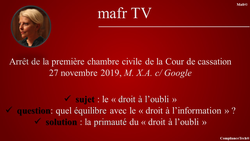
Regarder le film de 5 minutes sur le contenu, le sens et la portée de l'arrêt rendu par la première chambre civile de la Cour de cassation du 27 novembre 2019, M.X.A. c/ Google.
Cet arrêt casse l'arrêt de la Cour d'appel de Paris qui valide le non-déférencement, après que la CNIL a demandé l'interprétation des textes, notamment du RGPD, parce que le droit à l'oubli doit limiter l'exception ici invoquée, à savoir le droit à l'information, même s'il s'agit d'une décision pénale concernant un commissaire-aux-comptes, car il s'agit d'une affaire privée et non pas ce qui concerne l'exercice de sa profession réglementée coeur du système financier.

Oct. 15, 2019
Publications

This working paper has been the basis for the introduction in the presentation made in the conference organized by the Journal of Regulation & Compliance (JoRC) on the topic : Compliance Tools, in collaboration with many Universities partners.
This first conference has been organized with the Sciences po Economic Department on November 28, 2019 on Risks Mapping.
This working paper is articulated with a second working paper, being the basis of the first development of this conference, on the caractère nouveau ou non en Droit de l'obligation de cartographie des risques.
These two working papers are the basis for two articles published in the collective book, Compliance Tools, in the Series Regulations & Compliance.
Feb. 2, 2017
Conferences

Référence : Frison-Roche, M.-A., Le droit de la
Le Droit de la
En effet, les autorités publiques expriment des buts monumentaux dépassant le fonctionnement marchand et qu’elles n’ont pas les moyens de mettre en œuvre mais dont elles chargent certaines entreprises de la concrétisation. Ainsi, la
Face à ce phénomène américain, les entreprises européennes sont restées passives, se contentant d’être condamnées. Il convient bien plutôt de s’approprier ce Droit de la
Enedis est à ce titre un sujet dynamique de